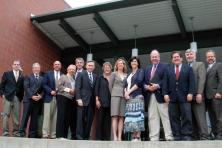Scientists and students at the Massachusetts Institute of Technology founded the Union of Concerned Scientists at the height of the Vietnam war when serious pollution caused Cleveland’s Cuyahoga River to catch on fire. The founding scientists called for scientific research to be shifted from military technologies to solve environmental and social problems. To this day, UCS has led by example, focusing on the scientific method, using findings to guide conclusions and recommendations, and sharing results with transparency, thereby earning a reputation for fairness and accuracy. UCS also mobilizes scientists and joins their voices with those of advocates, educators, business people, and other concerned citizens to build a healthy planet and a safer world.
Two UCS reports have been influential in shaping Climate Solutions’ approach to Moving Beyond Oil. The first is Fueling a Clean Transportation Future, in which UCS explores the dramatic changes in oil, electricity, and biofuels, explaining how gasoline derived from increasingly dirty petroleum is becoming more carbon-intensive, while alternative fuels, such as advanced, next-generation biofuels and electricity are getting more prevalent. The report notes that “[t]wo-thirds of all Americans now live in areas where driving an electric car produces fewer climate emissions than almost all comparable gasoline and gasoline hybrid cars—a fact attributable to more efficient vehicles and an increasingly clean electricity grid.”
The second report, to which Climate Solutions contributed, is Half the Oil: Pathways to Reduce Petroleum Use on the West Coast. Released in January 2016, the sturdy demonstrates how Washington, Oregon, and California could cut petroleum use in half by 2030. The three state’s economies combined equal the world’s fifth largest economy so achieving this level of carbon emission reduction would be significant both in terms of the actual reductions to be achieved, but also as an example to other states in the nation. The report’s conclusion is that half the oil is well within the grasp of the region of nearly 50 million people to achieve through better vehicle efficiency, use of lower-carbon fuels (electricity in particular), and improved local transportation planning and transit options.




